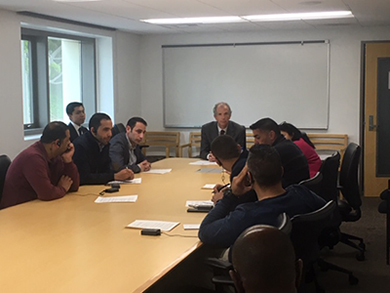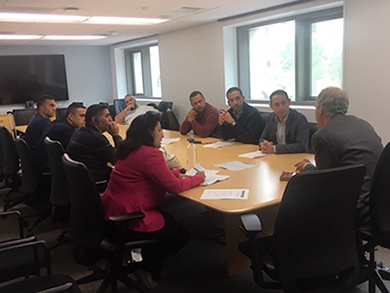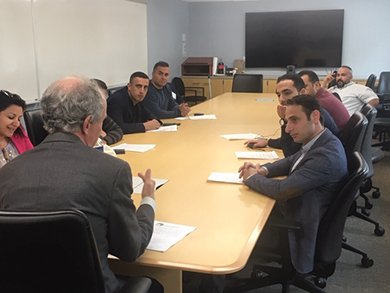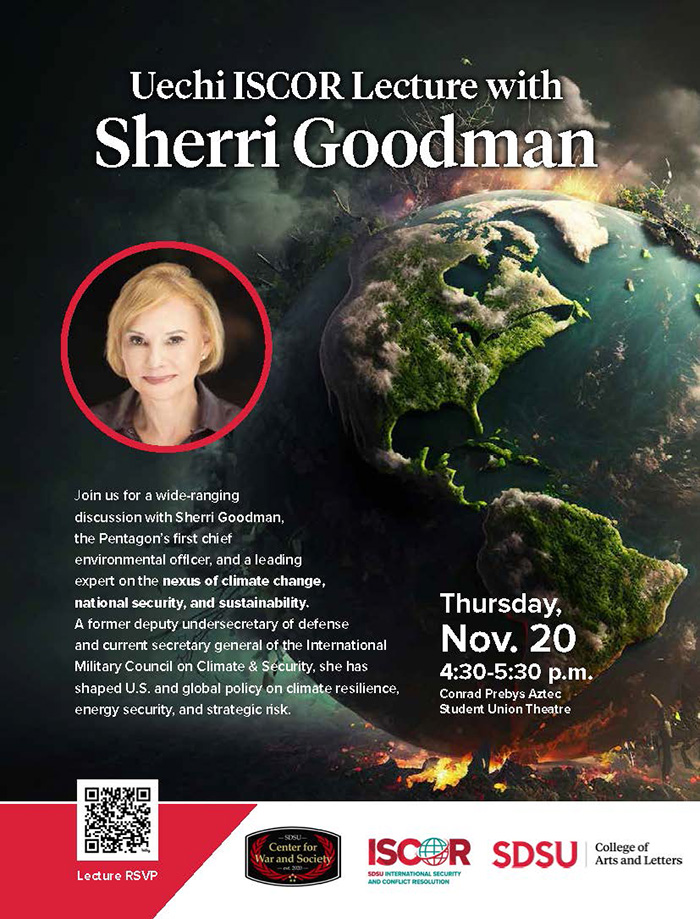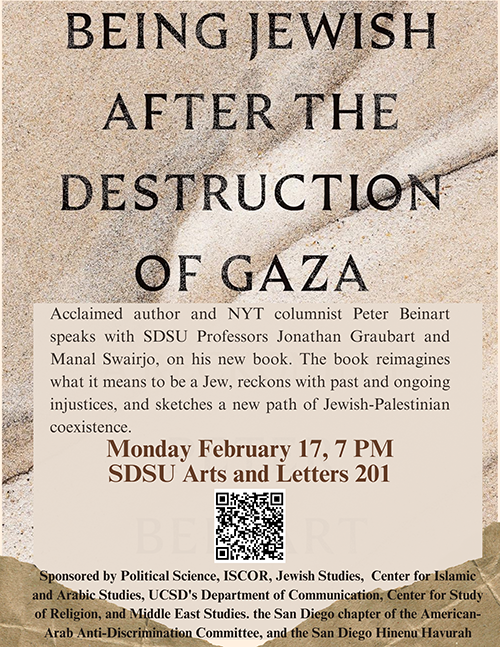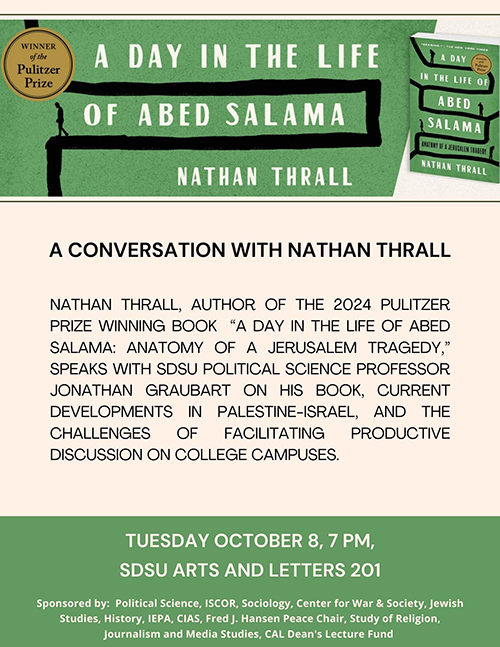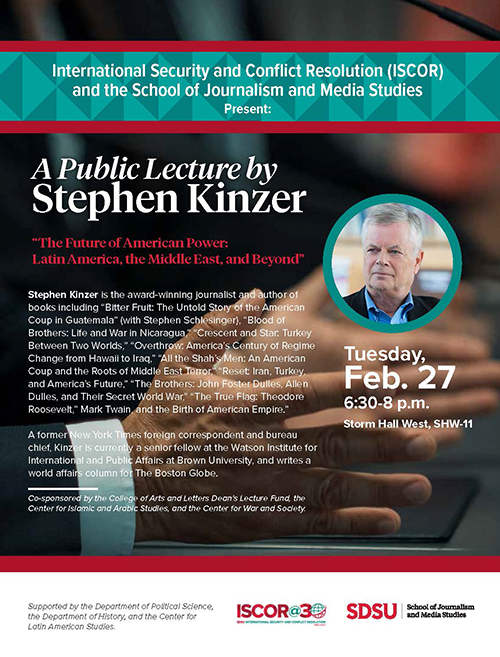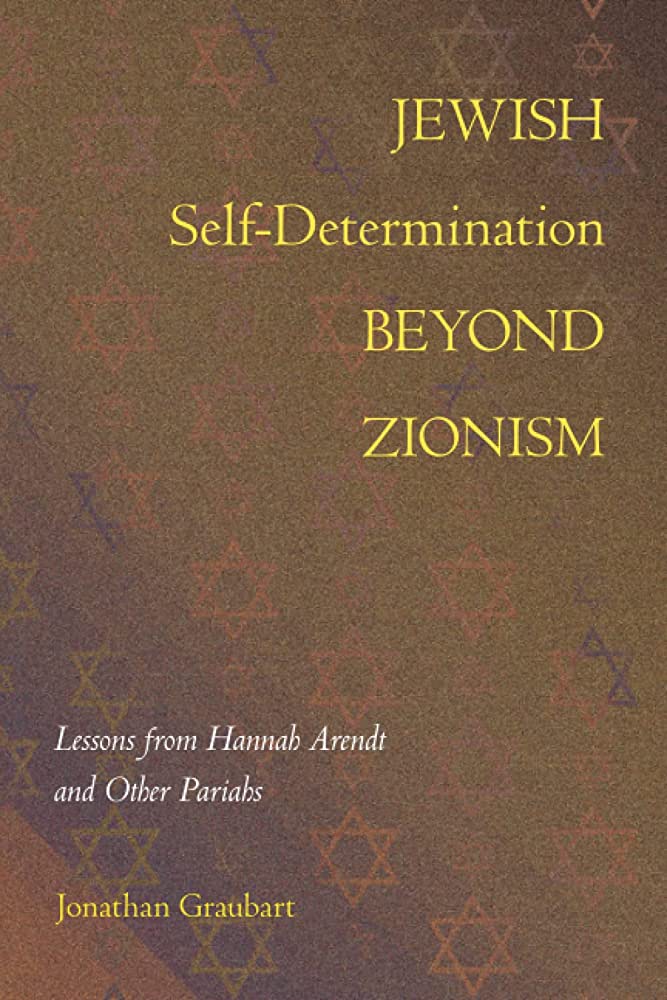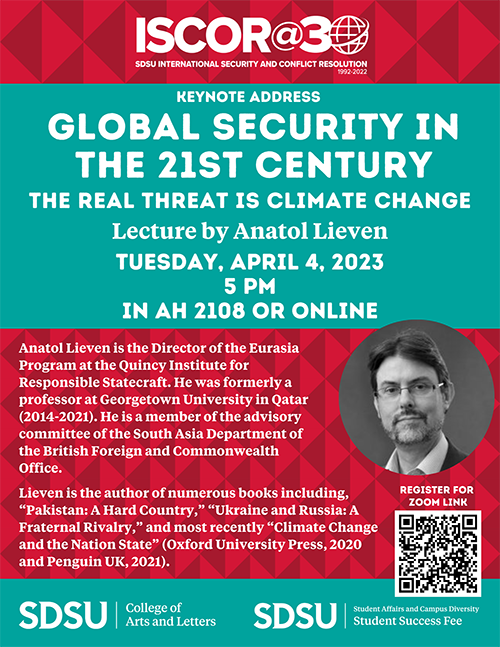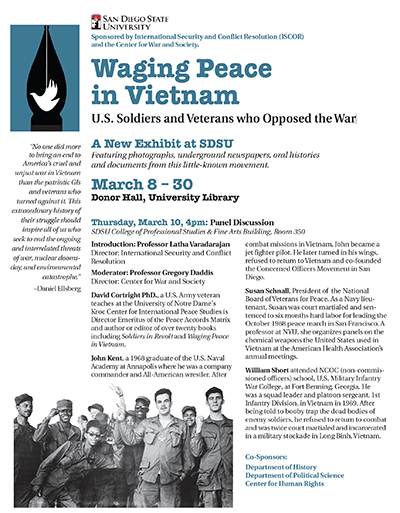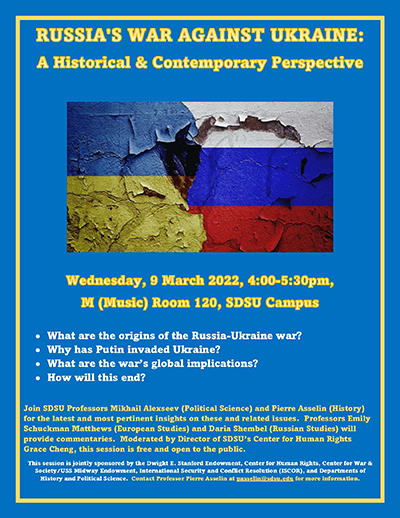
News and Events
Uechi ISCOR Lecture with Sherri Goodman
Thursday, Nov. 20, 4:30-5:30 p.m. in Conrad Prebys Aztec, Student Union Theatre
Join us for a wide-ranging discussion with Sherri Goodman, the Pentagon’s first chief environmental officer, and a leading expert on the nexus of climate change, national security, and sustainability. A former deputy undersecretary of defense and current secretary general of the International Military Council on Climate & Security, she has shaped U.S. and global policy on climate resilience, energy security, and strategic risk.
About Sherri Goodman
First Ever Pentagon Chief Environmental Officer, Sustainability & National Security Expert & Author
A pioneer in sustainability and national security, Sherri Goodman is among the most respected international voices on emerging global risks, including energy and climate security, environment and public health. The Pentagon’s first-ever Deputy Undersecretary of Defense (Environmental Security), Sherri led efforts to transform the Department of Defense into a leader in sustainability, climate resilience and advanced energy. Her book, Threat Multiplier: Climate, Military Leadership and the Fight for Global Security, gives readers an inside account, from the Pentagon to the battlefield, of today’s military on the front lines of a changing climate, the energy transition, technology upheavals and new health challenges.
Sherri is recognized for her ability to blend a compelling strategic vision with operational execution to strengthen national security and mission readiness. An experienced “change agent” for large institutions, including the U.S. Department of Defense, Sherri has founded, led or advised over a dozen public and private sector organizations for sustainable success.
Using her famous coinage “threat multiplier,” Sherri is credited with educating a generation of U.S. military and government officials about the nexus between climate change and national security, fundamentally shaping the field of climate and energy security. As the founder and first Executive Director of the CNA Military Advisory Board on Climate Change and National Security, she led the first efforts to assess the national security implications of climate change as a strategic imperative. This work led to more than a decade of bipartisan action on building energy and climate resilience in defense missions and protecting troops from growing biological and other health risks to protect resilience and troop health.
Today, Sherri serves as the Secretary General of the International Military Council on Climate & Security, the leading international organization for national security and military leaders on climate and energy security and as a Senior Fellow at the Wilson Center. Sherri advises governments and private firms on sustainability, energy, climate and technology opportunities.
Recognized by both military and environmental officials for her leadership in national security, energy and sustainability, Sherri has twice received the Department of Defense Distinguished Service Award, the Environmental Protection Agency’s Climate Change Award, the Lifetime Achievement Award from the Environmental Peacebuilding Association, as well as an Honorary Doctorate from Amherst College.
A sought-after speaker for domestic and international audiences, Sherri has appeared on CNN, PBS NewsHour, BBC, NPR and other major media. She is equally comfortable with keynotes and fireside chat formats. She has testified before many congressional committees as a leading authority on sustainability, energy, and climate security. She has taught and delivered lectures at numerous universities and has appeared in several films, including The Age of Consequences, Journey to Planet Earth, Carbon Nation and From Paris to Pittsburgh. Sherri has degrees from Harvard Law School, Harvard Kennedy School and Amherst College, where she was co-founder of the Women’s Ski Team.
This event is presented by the International Security and Conflict Resolution (ISCOR) program at the College of Arts and Letters, through generous funding by donor and alumnus Edward Uechi (ISCOR '05). Additional support is also provided by the Center for War and Society.
Archives
A Conversation with Peter Beinart
Monday, February 17, 7-8:30 p.m. in Arts and Letters 201
Watch the event recording.
Acclaimed author and columnist Peter Beinart will discuss his new book "Being Jewish After the Destruction of Gaza" with SDSU Professors Jonathan Graubart and Manal Swairjo. The book confronts the dominant “pro-Israel” narrative, which features a recurring Jewish experience of persecution and victimhood that endures even amid Israel’s destruction of Gaza. That narrative, Beinart argues, both warps our understanding of Israel-Palestine and erases the richness of the Jewish experience. He imagines an alternate narrative of what it means to be a Jew and how to reckon with injustices perpetrated in the name of the Jewish people. In this future, Israeli Jews have the right to equality, not supremacy, while Jewish and Palestinian safety and dignity are co-dependent, not mutually exclusive.
As Adam Hochschild writes, “At this painful moment, Peter Beinart’s voice is more vital than ever. His reach is broad—from the tragedy of today’s Middle East to the South Africa he knows well to events centuries ago—his scholarship is deep, and his heart is big. This book is not just about being Jewish in the shadow of today’s war, but about being a person who cares for justice.”
Peter Beinart is a professor of journalism and political science at the Craig Newmark Graduate School of Journalism at CUNY. He is also editor at large for Jewish Currents, publisher of The Beinart Notebook, a frequent contributor to The New York Times, and an MSNBC analyst.
Jonathan Graubart is a professor and chair of the SDSU Political Science Department. He is the author of "Jewish Self-Determination beyond Zionism: Lessons from Hannah Arendt and other Pariahs" (Temple University Press 2023). Graubart is a co-founder of Hinenu Havurah, a progressive Jewish collective in San Diego.
Manal Swairjo is a professor of biochemistry at SDSU. Her research focuses on RNA biogenesis processes and their links to human disease. Dr Swairjo was born in Gaza, Palestine. Much of her family in Gaza was killed by Israel’s destructive assault. In San Diego, she co-founded a Jewish-Palestinian dialogue in 2000 after the collapse of Oslo and the outbreak of the second Intifada.
A Conversation with Nathan Thrall
Tuesday, October 8, 2024
Watch the event recording.
Nathan Thrall will discuss “A Day in the Life of Abed Salama: Anatomy of a Jerusalem Tragedy” with SDSU Political Science Professor Jonathan Graubart. The book won the 2024 Pulitzer Prize for General Nonfiction. Beyond the events depicted in the book, the conversation will cover current developments in Gaza, the West Bank, and Israel and the challenges of facilitating productive discussion on college campuses.
Nathan Thrall is also the author of "The Only Language They Understand: Forcing Compromise in Israel and Palestine" (Metropolitan Books, 2017). His writing has appeared in The New York Times Magazine, The Guardian, London Review of Books, and The New York Review of Books and been translated into more than two dozen languages. He spent a decade at the International Crisis Group, where he was director of the Arab-Israeli Project, and has taught at Bard College. He lives in Jerusalem.
Jonathan Graubart is a professor and chair of the SDSU Political Science Department. He is the author of "Jewish Self-Determination beyond Zionism: Lessons from Hannah Arendt and other Pariahs" (Temple University Press 2023). His article “It is Deadly and Oppressive but Is It One State? Assessing the New One-State Reality Paradigm” is forthcoming in Palestine/Israel Review.
Sponsoring SDSU Departments and Programs: Political Science, Mann Public/Foreign Affairs Fund, International Security and Conflict Resolution, Center for Islamic and Arabic Studies, Jewish Studies, Study of Religion, History, Sociology, Fred J. Hansen Peace Chair, Institute for Ethics and Public Affairs, Center for War and Society, Journalism and Media Studies, CAL Dean’s Lecture Fund
Hannah Arendt on What Went Wrong with the Zionist Project
Bard College
October 23, 2023
Teach-in on Israel/ Palestine
San Diego State University
October 18, 2023
The Future of American Power: Latin America, the Middle East, and Beyond
A Public Lecture by Stephen Kinzer
Tuesday, February 27, 2024
6:30-8 p.m.
Storm Hall West, SHW-11
Stephen Kinzer is the award-winning journalist and author of books including “Bitter Fruit: The Untold Story of the American Coup in Guatemala” (with Stephen Schlesinger), “Blood of Brothers: Life and War in Nicaragua,” “Crescent and Star: Turkey Between Two Worlds,” “Overthrow: America’s Century of Regime Change from Hawaii to Iraq,” “All the Shah’s Men: An American Coup and the Roots of Middle East Terror,” “Reset: Iran, Turkey, and America’s Future,” “The Brothers: John Foster Dulles, Allen Dulles, and Their Secret World War,” “The True Flag: Theodore Roosevelt,” Mark Twain, and the Birth of American Empire.”
A former New York Times foreign correspondent and bureau chief, Kinzer is currently a senior fellow at the Watson Institute for International and Public Affairs at Brown University, and writes a world affairs column for The Boston Globe.
Presented by International Security and Conflict Resolution (ISCOR) and the School of Journalism and Media Studies.
Co-sponsored by the College of Arts and Letters Dean’s Lecture Fund, the Center for Islamic and Arabic Studies, and the Center for War and Society.
Supported by the Department of Political Science, the Department of History, and the Center for Latin American Studies.
 Why Iraq Still Matters
Why Iraq Still Matters
Thursday, November 9, 2023
12:30 - 1:45 p.m.
SDSU Conrad Prebys Aztec Student Union
It has been twenty years since the American invasion and occupation of Iraq. To mark this year’s Veterans Day, join us for a conversation with nationally-regarded scholars, and a veteran on the enduring and global consequences of that war and why it still matters today.
Featuring:
Zainab Saleh
Associate Professor of Anthropology, Haverford College
Steven Simon
Professor of Practice in Middle East Studies, University of Washington
Frank Sobchak
Chair of Irregular Warfare Studies, Modern Warfare Institute, West Point
Sponsored by J. Fred and Susan Oliver
Book Launch of "Jewish Self-Determination beyond Zionism: Lessons from Hannah Arendt and other Pariahs"
Tuesday, April 18, 2023
7-8:30 pm
in West Commons 230
In a conversation with Professor Farid Abdel-Nour, Professor Jonathan Graubart discusses his new book, "Jewish Self-Determination beyond Zionism: Lessons from Hannah Arendt and other Pariahs" (Temple University Press)
Sponsored by ISCOR and ISCOR Student Society.
30th Anniversary Celebration
Global Security in the 21st Century: The Real Threat is Climate Change
Lecture by Anatol Lieven
Tuesday, April 4, 2023
5 p.m.
Webinar (also broadcasted in Adam’s Humanities 2108)
Anatol Lieven is the Director of the Eurasia Program at the Quincy Institute for Responsible Statecraft. He was formerly a professor at Georgetown University in Qatar (2014-2021). He is a member of the advisory committee of the South Asia Department of the British Foreign and Commonwealth Office.
Lieven is the author of numerous books including, “Pakistan: A Hard Country,” “Ukraine and Russia: A Fraternal Rivalry,” and most recently “Climate Change and the Nation State” (Oxford University Press, 2020 and Penguin UK, 2021).
This event is funded, in part, by the San Diego State University Student Success Fees.
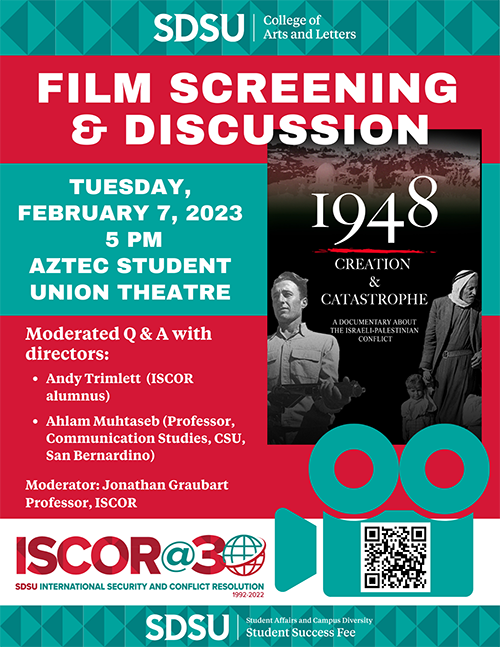 Film Screening and Discussion
Film Screening and Discussion
Join us for a film screening of "1948 Creation & Catastrophe," a documentary about the Israeli-Palestinian conflict.
Tuesday, February 7, 2023
5 p.m.
Aztec Student Union Theatre
A moderated Q&A with directors Andy Trimlett (ISCOR alumnus) and Ahlam Muhtaseb (Professor, Communication Studies, CSU, San Bernardino) will follow. ISCOR Professor Jonathan Graubart will moderate.
This event is funded, in part, by the San Diego State University Student Success Fees and the CAL Instructionally Related Activities Fund.
Political Violence and Pathways to Peace in Latin America Lecture Series
This series of 3 public lectures features experts on political violence and strategies for the guarantee of human rights and peacebuilding in Latin America and in the U.S.-Mexico Borderlands. The talks all give accounts of the implications of political violence, the connections between the long- term effects of war to the migrant crises of today, and ways in which local communities organize and respond to efforts for justice and peace.
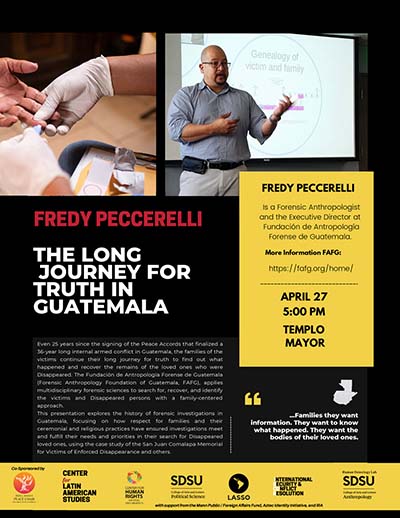
Freddy Peccerelli (Forensic Anthropologist and the Executive Director at Fundación de Antropología Forense de Guatemala)
Wednesday, April 27, 2022
5 PM
in Templo Mayor
The Long Journey for Truth in Guatemala
Even 25 years since the signing of the Peace Accords that finalized a 36-year long internal armed conflict in Guatemala, the families of the victims continue their long journey for truth to find out what happened and recover the remains of the loved ones who were Disappeared. The Fundación de Antropología Forense de Guatemala (Forensic Anthropology Foundation of Guatemala, FAFG), applies multidisciplinary forensic sciences to search for, recover, and identify the victims and Disappeared persons with a family-centered approach.
This presentation explores the history of forensic investigations in Guatemala, focusing
on how respect for families and their ceremonial and religious practices have ensured
investigations meet and fulfill their needs and priorities in their search for Disappeared
loved ones, using the case study of the San Juan Comalapa Memorial for Victims of
Enforced Disappearance and others.
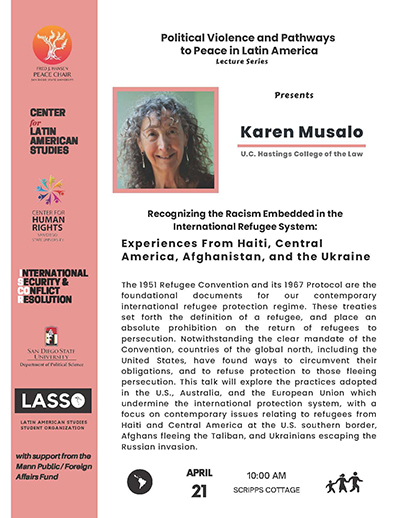
Karen Musalo, Ph.D. (U.C. Hastings College of the Law)
Thursday, April 21, 2022
10 AM
at Scripps Cottage
Recognizing the Racism Embedded in the International Refugee System: Experiences From Haiti, Central America, Afghanistan, and the Ukraine
The 1951 Refugee Convention and its 1967 Protocol are the foundational documents for
our contemporary international refugee protection regime. These treaties set forth
the definition of a refugee, and place an absolute prohibition on the return of refugees
to persecution. Not withstanding the clear mandate of the Convention, countries of
the global north, including the United States, have found ways to circumvent their
obligations, and to refuse protection to those fleeing persecution. This talk will
explore the practices adopted in the U.S., Australia, and the European Union which
undermine the international protection system, with a focus on contemporary issues
relating to refugees from Haiti and Central America at the U.S. southern border, Afghans
fleeing the Taliban, and Ukrainians escaping the Russian invasion.
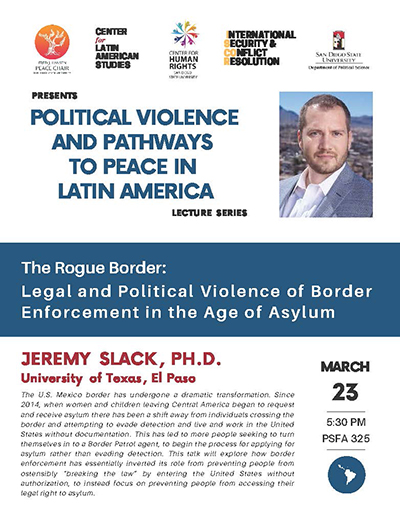
Jeremy Slack, Ph.D. (University of Texas, El Paso)
Wednesday, March 23, 2022
5:30 PM
in PSFA 325
The Rogue Border: Legal and Political Violence of Border Enforcement in the Age of Asylum
The U.S. Mexico border has undergone a dramatic transformation. Since 2014, when women and children leaving Central America began to request and receive asylum there has been a shift away from individuals crossing the border and attempting to evade detection and live and work in the United States without documentation. This has led to more people seeking to turn themselves in to a Border Patrol agent, to begin the process for applying for asylum rather than evading detection. This talk will explore how border enforcement has essentially inverted its role from preventing people from ostensibly “breaking the law” by entering the United States without authorization, to instead focus on preventing people from accessing their legal right to asylum.
Sponsored by The Fred J. Hansen Peace Chair and Center for Human Rights, with support
from the Center for Latin American Studies, ISCOR, and Department of Political Science
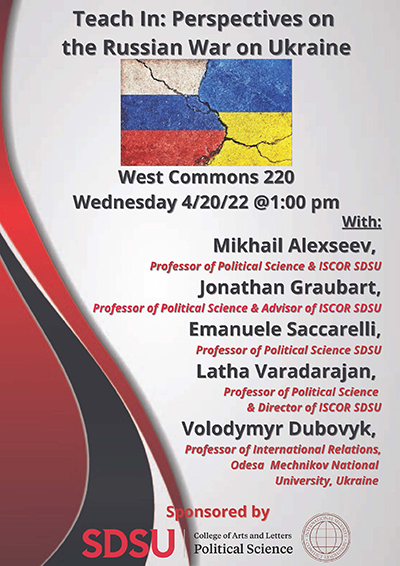 Teach in: Perspectives on the Russian War on Ukraine
Teach in: Perspectives on the Russian War on Ukraine
Wednesday, April 20, 2022
1 PM
in West Commons 220
The in-person event will feature a variety of perspectives on the on-going war in Ukraine, represented by a panel including myself and SDSU Professors Mikhail Alexseev, Jonathan Graubart, and Emanuele Saccarelli, as well as Professor Volodymyr Dubovyk of Odesa Mechnykov National University who will join us virtually from Ukraine.
Sponsored by ISCOR and the Department of Political Science
Waging Peace in Vietnam: U.S. Soldiers and Veterans who Opposed the War
A National Endowment for the Humanities “Dialogues of War” Workshop Series
A New Exhibit at SDSU
March 8-30
Donor Hall, University Library
Featuring photographs, underground newspapers, oral histories and documents from this little-known movement.
Panel Discussion
Thursday, March 10, 4 pm
Professional Studies & Fine Arts (PSFA) Building, Room 350
Introduction: Professor Latha Varadarajan
Director: International Security and Conflict Resolution
Moderator: Professor Gregory Daddis
Director: Center for War and Society
David Cortright Ph.D., a U.S. Army veteran teaches at the University of Notre Dame's Kroc Center for International Peace Studies is Director Emeritus of the Peace Accords Matrix and author or editor of over twenty books including Soldiers in Revolt and Waging Peace in Vietnam.
John Kent, a 1968 graduate of the U.S. Naval Academy at Annapolis where he was a company commander and All-American wrestler. After combat missions in Vietnam, John became a jet fighter pilot. He later turned in his wings, refused to return to Vietnam and co-founded the Concerned Officers Movement in San Diego.
Susan Schnall, President of the National Board of Veterans for Peace. As a Navy lieutenant, Susan was court martialed and sentenced to six months hard labor for leading the October 1968 peace march in San Francisco. A professor at NYU, she organizes panels on the chemical weapons the United States used in Vietnam at the American Health Association’s annual meetings.
William Short attended NCOC (non-commissioned officers) school, U.S. Military Infantry War College, at Fort Benning, Georgia. He was a squad leader and platoon sergeant, 1st Infantry Division, in Vietnam in 1969. After being told to booby trap the dead bodies of enemy soldiers, he refused to return to combat and was twice court martialed and incarcerated in a military stockade in Long Binh, Vietnam.
Sponsored by International Security and Conflict Resolution (ISCOR), Center for War and Society, Department of History, Department of Political Science, and Center for Human Rights.
Russia's War Against Ukraine: A Historical and Contemporary Perspective
Wednesday, 9 March 2022, 4-5:30pm
Music, Room 120, SDSU Campus
Free and open to the public.
- What are the origins of the Russia-Ukraine war?
- Why has Putin invaded Ukraine?
- What is the war’s global implications?
- How will this end?
Join SDSU Professors Mikhail Alexseev (Political Science) and Pierre Asselin (History) for the latest and most pertinent insights on these and related issues. Professors Emily Schuckman Matthews (European Studies) and Daria Shembel (Russian Studies) will provide commentaries. Moderated by Director of SDSU’s Center for Human Rights Grace Cheng.
Sponsored by the Dwight E. Stanford Endowment, Center for Human Rights, Center for War & Society/USS Midway Endowment, International Security and Conflict Resolution (ISCOR), and Departments of History and Political Science.
Contact Professor Pierre Asselin at [email protected] for more information.
Terrorism and Counter-Terrorism in the Post 9/11 World
Wednesday, November 17, 2021
5:00 p.m.
Join us for a conversation on the historical trajectory of terrorism and counter-terrorism strategies in the two decades since 9/11 and the declaration of the "War on Terror."
Featuring: Professor Emeritus, Dipak Gupta
Professor Gupta is the former director of theISCOR program and a renowned global authority on terrorism. He is the author of numerous books and articles, including most recently "Understanding Terrorism and Political Violence."
Moderated by: Professor Jonathan Graubart
Co-sponsored by the ISCOR Student Society and the Department of Political Science.
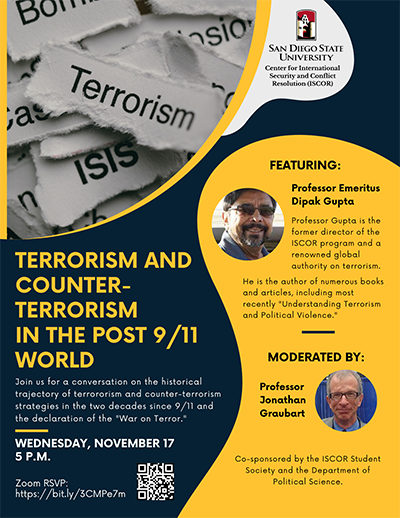
Reflecting on the Legacies of 9/11
Thursday, Sept. 9, 2021
4 p.m.
Featured Panelists:
- Judge Najla Ayoubi, Chief of Coalition & Global Programs, Every Woman Treaty
- Maj (Ret) Danny Sjursen, Director, Eisenhower Media Network
- Bill Van Auken, Editorial Board, World Socialist Web Site
Moderated By:
- Professor Gregory Daddis, Department of History
- Professor Latha Varadarajan, Director, International Security and Conflict Resolution (ISCOR)
Presented by ISCOR and the Department of History and co-sponsored by the College of Arts and Letters
Panel Discussion: Academic Freedom - Perspectives of U.S. and International Scholars
Monday, March 2, 2020 at 7 PM
International Student Center (part of the SDSU Passport Office)
Refreshments will be provided.
Academic freedom is the indispensable requisite for unfettered teaching and research in institutions of higher education.
"The common good depends upon the free search for truth and its free exposition"
--1940 Statement of Principles on Academic Freedom and Tenure, American Association
of University Professors
Academic freedom is threatened in the U.S. and internationally. In 2019, the Scholars at Risk Network reported 324 attacks on higher education communities in 56 countries (www.scholarsatrisk.org). Panelists from SDSU are joined by two Visiting Scholars at Risk, who are teaching at UCSD and SDSU.
Sponsored by Senate Freedom of Expression Committee, Institute for Ethics and Public Affairs, Interdisciplinary Human Rights Initiative, International Security and Conflict Resolution, and International Student Center
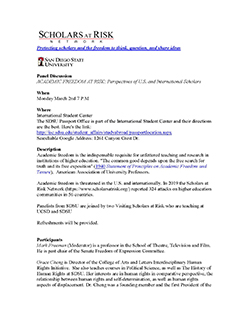
Additional rows continue using this layout.
Asylum After Empire: Colonial Legacies in the Politics of Asylum Seeking
March 5, 2020 at 12:30-1:45 PM
Alan and Debbie Gold Auditorium, Donald P. Shiley BioScience Center
Lucy Mayblin: Senior Lecturer in Sociology, University of Sheffield
Asylum seekers are not welcome in Europe. But why is that the case? For many scholars, the policies have become more restrictive over recent decades because the asylum seekers have changed. This talk, based on Mayblin's book Asylum After Empire, draws on theoretical insights from Third World Approaches to International Law, post- and decolonial studies, and presents archival research on the colonial context to the Geneva Convention negotiations. Policies which address asylum seekers must, the book argues, be understood not only as part of a global hypermobile present, but within the context of colonial histories.
Part of the Imagine Europe Series. Presented by the Center for European Studies.
Sponsored by the European Studies Dept, European Studies Program, Italian Program, ISCOR, Dept of Philosophy, Dept of Sociology, Dept of Political Science and made possible by an IRA award from the College of Arts and Letters.
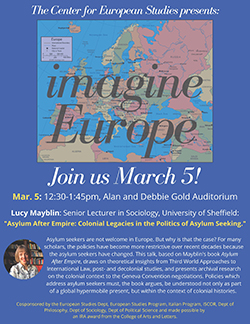
ISCOR Students Create “The Spotlight” Podcast to Demystify Current Events
Episode 1 features an interview with Pierre Asselin, history professor; episode 2 features Jonathan Graubart, political science professor.
When international security and conflict resolution (ISCOR) Director and Professor Latha Varadarajan was discussing issues in global security with her class in spring 2023, she floated the idea of a podcast about current events that would be student-focused and student-led.
Enter Avery Cochrane, a fourth-year political science student, and John-Michael Ellis, a history student, who had met in Varadarajan’s ISCOR Global Systems class in fall 2022 and were part of the cohort in her upper-division class on National Security Policy in the spring. Both are minoring in ISCOR.
The David H. Johns Memorial Scholarship
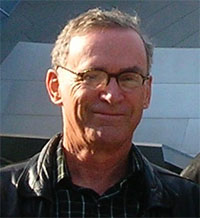 ISCOR is proud to announce the establishment of the annual David H. Johns memorial
scholarship. Prof. Johns was one of the founders of ISCOR, and his vision has been
key in making it the thriving multi-disciplinary center it is today. Given his contributions
in teaching and advising during his many decades at SDSU, and constant support for
the program after attaining the status of emeritus faculty, we are honored to have
an annual scholarship in in his name recognizing an ISCOR student who shows great
potential.
ISCOR is proud to announce the establishment of the annual David H. Johns memorial
scholarship. Prof. Johns was one of the founders of ISCOR, and his vision has been
key in making it the thriving multi-disciplinary center it is today. Given his contributions
in teaching and advising during his many decades at SDSU, and constant support for
the program after attaining the status of emeritus faculty, we are honored to have
an annual scholarship in in his name recognizing an ISCOR student who shows great
potential.
- Recipient must be students pursuing a major in International Security and Conflict Resolution.
- All class levels are eligible
- Recipients must have a minimum overall GPA of 2.50 out of 4.00, or the arithmetic equivalent
- Recipients must be enrolled full-time
- Scholarships may be renewed.
Meeting with the Palestinian Presidential Guard
Professor Jonathan Graubart, Director of the International Security and Conflict Resolution Program at SDSU, welcomed the Palestinian Presidential Guard delegation on May 9, 2019.
